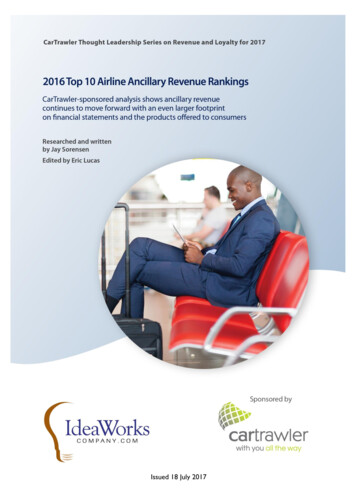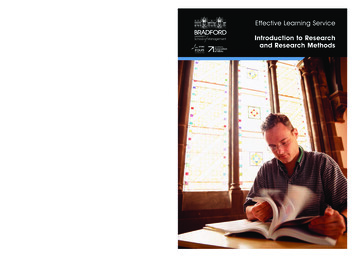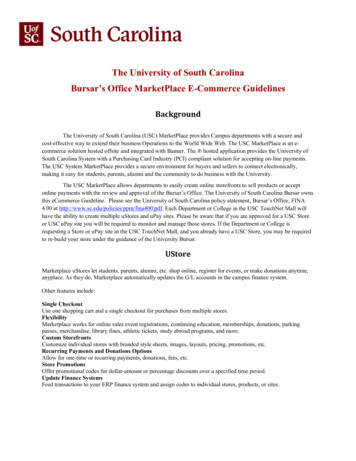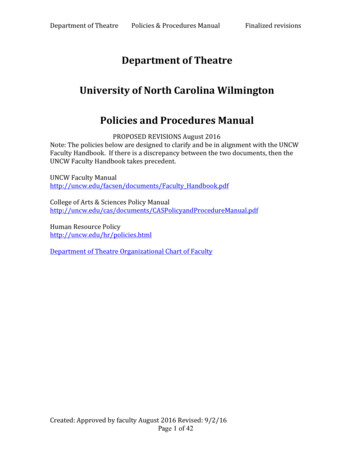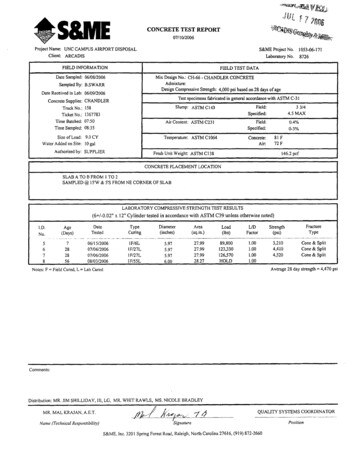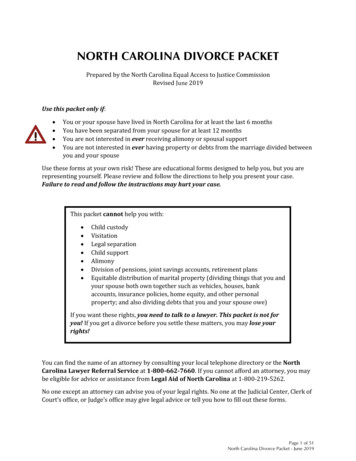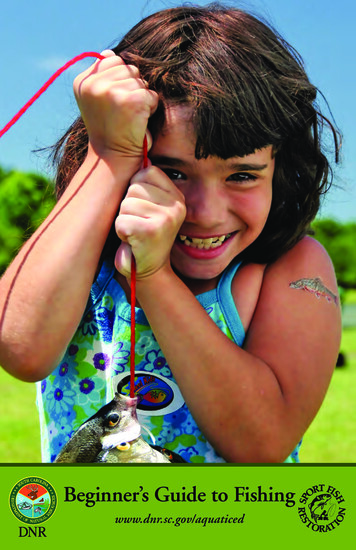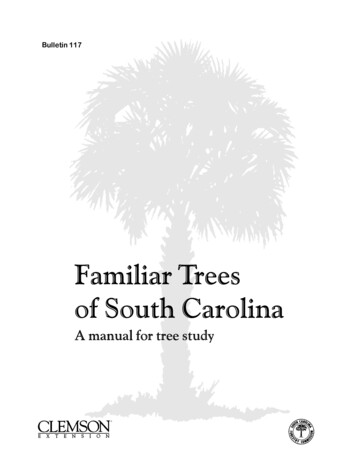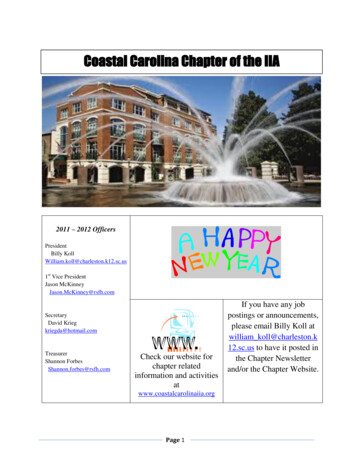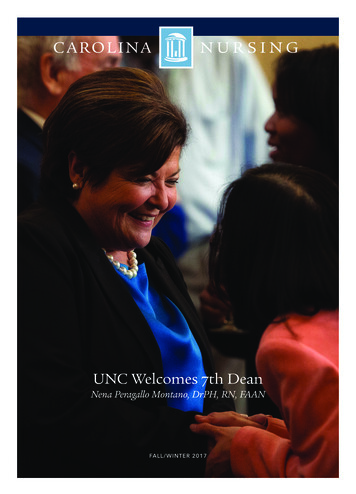
Transcription
Carolina Nursing Fall2017 COVER v3.qxp Layout 1 9/29/17 10:09 AM Page 3C A RO L I N ANURSINGUNC Welcomes 7th DeanNena Peragallo Montano, DrPH, RN, FAANFAL L/ WI NT E R 20 17
D e a r A l u m n i a n d Fr i e n d s ,It’s hard to believe I’m nearing the end of my first year at Carolina Nursing. As I taketime to reflect on all the work we’ve done in this short period of time, I’m struck againwith the warmth, hospitality, and intellectual vibrancy I’ve met with from so many here.From students to alumni to faculty to campus colleagues, my welcome has beenenthusiastic and supportive— a great encouragement to a new dean ushering in atime of growth and change.I came to UNC well acquainted with its reputation for academic rigor, scientificproductivity, and emphasis on service to the people of North Carolina, all of whichwere great attractions for me, and none of which have disappointed. The ethos toserve and improve the lives of the people of this state is very real at the SON, and I amproud of the work our faculty and students undertake each day to further that service,especially for our underserved and rural populations.From Hurricane Matthew relief efforts to mobile health clinics, to new faculty practicesites, to furthering mental health care in our rural communities, to improving thediversity of the state’s nursing workforce, our faculty and students train their sights andbest efforts on relieving the needs of our fellow citizens and neighbors. Our missionto serve is thriving.Likewise in full vigor are our missions to educate and discover. 2017 has seen the startof a thorough, faculty-led curriculum review and revision; the hiring of a new executivedean and associate dean for academic affairs in Peggy Wilmoth (see page 11 for moreon Dr. Wilmoth); and the introduction of a new academic structure. Meanwhile ourresearch enterprise has been busy and productive under the direction of Dr. RuthAnderson, our associate dean for research, who was recently honored by theUniversity with an endowed Kenan Distinguished Professorship, one of the highesthonors that can be bestowed on a faculty member by their colleagues here.continued on next page1
This summer also saw the launch of a much-needed new website for the School(nursing.unc.edu), as well as the launch of the all-new SON Portal, a searchable,easy-access, online information hub for current students, faculty, and staff(sonportal.unc.edu). Indeed, it is an exciting time to be at Carolina Nursing!But of course there’s more work to do.This month, we join the University in kicking off the Campaign for Carolina, 4.25billioneffortto raiseprivatedollarsto secureUniversity’sa 2billioneffortto raiseprivatedollarsto securethetheUniversity’sandandSON’s place among the best academic institutions in the nation.For the SON, this will mean a 22 million effort to ensure our ability to compete forand retain the best of the scarce resource of nursing faculty and students, throughendowed professorships and scholarships, as well as resources to upgrade facilitiesand to support our local and global outreach. It’s a significant sum for a School ofNursing to raise, but with the extraordinary support this School enjoys among you,its alumni, friends, and the community, we’re excited to get started!We’re also excited to know that even with a history as full of highlights as the School’shas been, its best days are ahead. Thank you for all you do to make that true.Warmly,Nena“Our vision is to become the numberone public School of Nursing in the United Statesto ensure the highest-quality nursing education,science, and practice for the people of NorthCarolina. The talent is here to get us there; we justneed the resources to retain what we have of thebest and brightest in our field, and to attract moresuch talent to our faculty and student ranks.”27 YEARS / GOAL: 22 MILLIONThe UNC School of Nursing remains one of the world’s very best, but nowmore than ever, we need the help of friends and supporters to strengthenour position against challenges facing schools of nursing across the country,challenges that lead to increased competition to recruit and retain the bestfaculty and students for Carolina: a nationwide shortage of nursing faculty,leaner federal budgets for scientific discovery, rising tuition, and aging facilities.Four key ways you can help:12Faculty Support — to ensurethe strength of our educationalofferings, research enterprise, andservice to the public, we needendowed professorships, facultydevelopment, and seed and travelfunds.Student Support — to ensurethat the best and brightestnursing students can study,practice, and advance healthcare in North Carolina, we needscholarships, emergency funds,travel funds, and externship andclinical training funds.43Global and Local Outreach —to ensure our mission of serviceto the people of North Carolinaand beyond, we need facultyservice professorships, globaland local travel awards, mobileclinic support funds, andresearch funds.Facilities Support — to ensure thatthe School of Nursing keeps pacewith the latest advancements innursing education and science, weneed funds to update our clinicalskills labs, improve our classroomsand technology, and renovateCarrington Hall.3
Contents511F E AT U R EYou Can Call Her NenaSchool News23Development32Honor Roll of Giving48She isDr. Nilda Peragallo Montano, butyou can call her Nena.Alumni NewsShe is a force. Energetic, decisive, attentive, thoughtful. She wears themantle of leadership comfortably and she gets things done. She ismotivated to act by a mission to care, and she means to change thingsfor the better. She is propulsive and real, plainspoken and warm.She is a nurse, in other words.45
Her internationally recognized researchcareer grew out of a single moment ofprofound empathy.“I did my first big study at the University of Illinoisin Chicago—it included 780 women and focusedon sexually transmitted infections and HIV. It wascalled SEPA, which means ‘you know’ in Spanish,and it included demonstrations, role-playing,and skills building. The intervention has beenextremely successful. We did a second study inMiami where we looked at the intervention’seffects on violence prevention. When PresidentObama issued his statement to establish aworking group on the intersection of HIV/AIDS,violence against women and girls, and genderrelated health disparities, the only nursing studyhe cited was ours.”“I was doing clinical work with students manyyears ago at the start of the AIDS epidemicwhen there was a lot of fear and stigma andmisinformation surrounding the disease. Oneof my students and I walked into the room of apatient, and it was immediately clear he had beenneglected. There were trays everywhere that noone had picked up; his curtain was drawn, hisroom was dark, and he was entirely alone. I feltterrible for him. We cleaned the room, raised theblinds, sat down on the bed, and held his handand talked with him. It was a terribly affectingexperience. It was then I got interested inresearch on HIV/AIDS. My first study was arandom survey of nurses’ knowledge of thedisease and their attitudes and potential biastoward AIDS patients. I found a connection, butit wasn’t that nurses didn’t want to take care ofpatients—it wasn’t a true bias—there just wasn’tenough knowledge in the ’80s about the AIDSepidemic. I wanted to take part in changing that.”She asks, and listens to the answers.“I’ve spent this early time at the School gettingto know as much about it and our history aspossible; likewise, our faculty, students, theUniversity, and other schools in the university.I have been meeting with our alumni and wantto get to know our state legislators. I also wantto know more about our clinical partners, as Ibelieve collaboration with them is critical tomeeting the educational needs of our studentsand ultimately the health care needs of the statewe serve and patients beyond it.Her research is a change-maker.“Once a nurse, always a nurse,” she says, and herface crinkles and her eyes light up as she doesso. She understands the value of this collectiveidentity. At the bedside or in the clinic, classroom,lab, or office, she believes all nurses share hersame passion for care and manifest it through aunique and valuable set of skills. They look forsolutions, create a culture of support, and mostof all, effect change.Until you meet her in person, here’s a sneak peekat our School’s new leader:She greatly respects the reputation ofUNC and the School of Nursing.“Carolina is an exceptional university. It is wellrecognized and has a long heritage of prestige.And it’s a Research 1 university, which means a lotof important and useful research activity is takingplace here, and the School of Nursing is a vitalcontributor to that. We have really talented facultyand students at the School, and so much potentialto grow our research activity for the betterment ofpatients in and beyond North Carolina. I amincredibly proud to be the seventh dean of thisfine School and motivated to do a job worthyof it.”As a nurse, educator, scientist, and administrator,Nena brings all these attributes and more to theSchool of Nursing’s dean’s suite. They inform thechoices she makes as our seventh dean andinspire her leadership as she seeks newopportunities, weighs possibilities, definesoptions, and sets new standards for creativityand innovation in an increasingly global arena.6“As an outcome of that first project, Floridachanged its licensing renewal requirements fornurses to include HIV education. I was very proudof that outcome, but mostly it’s an excellentexample of the very real value of nursing researchto patient care. Our science isn’t an ivory towerexercise—far from it. Our science is so patientcentric it can effect real, on-the-ground changein health care.“I love that the missionof Carolina is so uniquelytied to the people of thestate. ‘Of the people, forthe people’ is a beautifuland resonant ethos.”“From there, I went on to focus on what washappening with Latinas and HIV. At the time,attention was almost solely focused on drug usersand male-to-male sex, with no attention given towomen. So, when I went for my postdoc at theUniversity of Pennsylvania (which she attended asa Robert Wood Johnson Clinical Nurse Scholar),I focused my research on women and HIV.continued on next page7
She encourages diversity as a path tothe future.“North Carolina has a diverse population—ruraland urban populations, a wide range of races andethnicities, many vulnerable and underservedpopulations. I would like to see the diversity ofour faculty and students mirror that of our state’spopulation, and I’d particularly like to see moremen enter the profession.“We’re well on ourway to effectingreal, positive changefor the professionand for patientsthe world over.”The public we treat is diverse, and we shouldhave nurses who look like, identify with, and talklike the people they’re taking care of. I want todiversify what we are doing in research to ensurethat certain populations aren’t overlooked orignored. We have interesting projects and abroad portfolio of funding grants on both theteaching and research fronts, and we’re well onour way to effecting real, positive change for theprofession and for patients the world over.”Her leadership is grounded in a passionfor nursing.“I’ve always loved nursing. I worked in a hospitalat the bedside, and then grew into academiafrom clinical nurse to teacher, researcher, andadministrator. I have practiced in Chile, inGermany, and other points on the globe. Thereare so many opportunities in this profession todo and be what you want.“I love that the mission of Carolina is so uniquelytied to the people of the state. ‘Of the people, forthe people’ is a beautiful and resonant ethos, andI think it behooves the School to conduct an indepth assessment of what is needed in our stateso we can direct our efforts to meet those needs.“We are the largest segment of the health carecommunity, and we should be proud. When youlook at the top jobs for growth, health care is atthe top. The Institute of Medicine’s Future ofNursing Report asks nurses to take an evengreater role in our changing and complex healthcare system. It’s important for the School to lookat how we are aligned with that effort. CarolinaNursing has a powerful reputation for excellenceand visionary thinking—we’re in our rightful placewhen we’re leading the profession into the 21stcentury.”“We know there is a shortage of nurses in NorthCarolina, especially in rural areas. What can ourfaculty, alumni, and clinical partners tell us aboutthat shortage or other health care needs facingour neighbors? This kind of information isessential to helping us map out our direction andleverage our resources to shift focus, expand orcontract programs, raise funds for new initiativesor facilities, and so on. Everything is dependenton assessing the needs of the state.”continued on next page89
Doctor of Public Health, the University of TexasMaster of Science in Nursing, the University of West VirginiaBachelor of Science in Nursing, the University of ChileFellow, the American Academy of NursingInductee, Sigma Theta Tau International Nurse Researcher Hall of FameDr. Peragallo Montano is internationally known for herresearch in health disparities, cultural competency, andthe recruitment and retention of minorities in nursing.BeeberShe believes alumni turn knowledgeinto action.She will push the envelope.“It’s a priority to grow research here at CarolinaNursing—it’s a useful source of much-neededfunding, but more importantly, it’s a directreflection of our mission, and a way for theSchool to effect real, lasting change in healthcare and improve the lives of humankind.“Our alumni are a critical part of the makeup ofthe School of Nursing and integral to our identity.They know the school. They’re so proud of beingCarolina nurses and they’re such an asset: theyare our representatives, our public image, andour ambassadors. I love meeting our alumniface to face and hearing the School’s historydirect from the source.Selection criteria for fellowship include evidence of significant contributionsto nursing and health care, and sponsorship by two current Academy fellows.Applicants are reviewed by a panel consisting of elected and appointed fellows,and selection is based, in part, on the extent to which the nominee’s nursingcareer has influenced health policies and the health and well-being of all.BlackThe Class of 2017 joins this impressive list of School of Nursing faculty:“We have a great and talented faculty who aredoing a terrific job and want to do more toadvance good health and well-being.“I want to understand our alumni’s thoughts,opinions, and vision for their alma mater. I wantthem to have a close relationship with theSchool and vice versa, so they can lead us toopportunities and relationships they havecultivated.“And we’re in the midst of conducting a thoughtfulenvironmental scan because health care ischanging daily, and nurses are important to allthe changes. We need to communicate with ourclinical partners and ask, ‘What are you lookingfor, and how can we meet those needs?’ We needto respond by evaluating our programs based onthose needs and updating our curriculum.“We have a lot of work to do together: we needto feed the pipeline for retiring nurses and nursefaculty; we need to advance the discipline; weneed to diversify our resources—and they canhelp us prepare the next generation to serve.Their input is integral to the advancement ofour agenda, and it is a win-win for everyone whois engaged and invested in the School.”“I want to see Carolina Nursing go to the very topof nursing school rankings—not because rankingsare important in and of themselves, but becausethey’re a measure of our success in bringing thebest in nursing education, research, and service topeople in and beyond North Carolina. It may takeus a little time, but we will do it.” G. Rumay Alexander, EdD, RN, FAANRuth Anderson, PhD, RN, FAANLinda Beeber, PhD, PMHCNS-BC, FAANDiane Berry, PhD, ANP-BC, FAANP, FAANGiscombeLinda Cronenwett, PhD, RN, FAANCarol Durham, EdD, RN, ANEF, FAANDonna Sullivan Havens, PhD, RN, FAANCheryl Jones, PhD, RN, FAANKathleen Knafl, PhD, FAANBarbara Mark, PhD, RN, FAANJeneretteDeborah K. Mayer, PhD, RN, AOCN, FAANMary H. Palmer, PhD, RN, AGSF, FAANNilda (Nena) Peragallo Montano, DrPH, RN, FAANGwen Sherwood, PhD, RN, FAANSuzanne Thoyre, PhD, RN, FAANMarcia Van Riper, PhD, RN, FAANMargaret “Peggy” Wilmoth, PhD, RN, FAANWaldrop10In June 2017, the American Academy of Nursing announced its selectionof 173 highly distinguished nurse leaders for its 2017 class of Academyfellows, five of whom are UNC School of Nursing faculty. We are delightedto congratulate Drs. Anna Beeber, Beth Black, Cheryl Giscombe, CorettaJenerette, and Julee Waldrop on this significant achievement! This classmarks the first time the UNC School of Nursing has had five faculty selectedto fellowship in the Academy in one year.SeonAe Yeo, PhD, RNC, WHNP, FAAN11S C H O O L N E WSDr. Nena Peragallo MontanoFive SON Faculty Electedto Fellowship in AmericanAcademy of Nursing
TheFeedingFlockNourishing research forchildhood feeding disordersEating: more than 30 nerves and muscles must engage in near-perfectsequence to perform this act critical to growth, strength, brain development,and behavior. Most children never give it a second thought; but for morethan 1 million U.S. children under the age of 5 and their families*, it’sa difficult, daunting, and life-altering challenge. The Feeding Flock at theUNC School of Nursing exposes barriers to feeding for infants and youngchildren and informs interventions for families and the medical communitywho care for them. And they’re making a difference.The teamThe Feeding Flock research team grew out of shared interests. In 2009, PhDstudents Jinhee Park, Britt Pados, and Hayley Estrem joined their mentor,Francis Hill Fox Distinguished Term Professor Sue Thoyre, PhD, RN, FAAN,to develop ways to measure feeding problems during infancy andchildhood and build a stronger evidence base for care. As team membersgraduated, they continued to work together to advance the science. Pados,an assistant professor at UNC who lives in Boston, and Park, an assistantprofessor in the Connell School of Nursing at Boston College, collaborateremotely. Estrem is currently a postdoctoral fellow with Carolina’s Centerfor Developmental Science. “By 2012, we knew we were productivetogether and would continue to work together throughout our careers,”Thoyre said. As the initiative grew in reach and scope, The Feeding Flockadded team members Eric Hodges, a faculty fellow in the Center forDevelopmental Science and associate professor in the School’s FamilyHealth Division, and Cara McComish, a speech-language pathologist andassistant professor in the Division of Speech and Hearing Sciences. Clinicianand pediatric speech pathologist Krisi Brackett, MS, CCC-SLP, rounds outthe team. Together, they reflect the knowledge and talents of neonatal andfamily nurses, nurse researchers, speech and hearing science research,family research, and speech pathology.The infantsgenerate good suction.” Feeding problems canbe exacerbated or facilitated by external factors.Babies in the NICU are fed about eight times aday by multiple feeders: nurses rotating on oroff a shift, parents or grandparents, speech oroccupational therapists. “You can think of the sizeand shape of a person’s body—each personholds the baby a different way—and this changesthe feeding dynamic,” Thoyre said. “Feedingstrategies make a difference. Someone mightthink it’s best to hurry the baby through a feedingso the baby doesn’t tire. Consistent strategiesfrom feeder to feeder can support the infant’sbreathing and make a big difference. “And ofcourse, breastfeeding for all vulnerable infants isthe most optimal feeding strategy that can beoffered,” Thoyre added.Breathe. Suck. Swallow. Even in healthy infan
Carolina Nursing Fall2017 COVER v3.qxp_Layout 1 9/29/17 10:09 AM Page 3. 1 D e a r A lu m n i a n d F rie n d s, ItÕs h a rd to b e lie ve IÕm n e a rin g th e e n d o f m y Þ rst ye a r at C a ro lin a N u rsin g . A s I ta k

